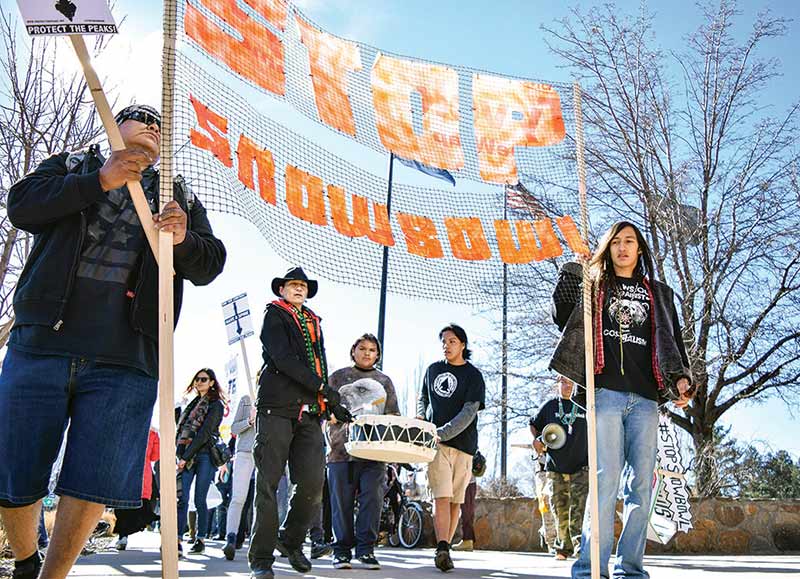
Protesters march against Snowbowl, snowmaking

Navajo Times | Krista Allen More than 50 demonstrators march across downtown Flagstaff on Jan. 14 urging the city council to end the city’s contract with the Arizona Snowbowl ski resort, which uses 100 percent effluent to make artificial snow.

Navajo Times | Krista Allen
More than 50 demonstrators march across downtown Flagstaff on Jan. 14 urging the city council to end the city’s contract with the Arizona Snowbowl ski resort, which uses 100 percent effluent to make artificial snow.
FLAGSTAFF
Just the day before Martin Luther King Jr. Day, a vehement group against the expansion of Arizona Snowbowl and snowmaking on Dook’o’ooslííd, marched across downtown Flagstaff, urging the city council to end the city’s contract with the ski resort.
“Please, please, please, out of urgency!” Scottie Begay exclaimed during a mountain protector rally outside Flagstaff City Hall on Sunday afternoon. “We’re ancestors for those who haven’t even come yet!”
Snowmaking at Snowbowl, though, will continue its controversial practice of making snow from treated wastewater for the next 16 years. Flagstaff officials in August 2014 approved the ski resort’s extension agreement, giving the ski area access to reclaimed wastewater through 2034.
The contract renewal and extension came at the request of Snowbowl General Manager J.R. Murray, who said in July 2014 that he was looking for more long-term certainty before borrowing and investing money.
Snowbowl and the city of Flagstaff initially entered into a five-year contract in 2002. But wastewater was not used until December 2012 because of construction delays and legal challenges by a number of environmental groups and 13 tribes that use the sacred mountain for ceremonies and religious purposes.
Individuals against the expansion of Arizona Snowbowl and snowmaking at that time criticized the decision, saying it is “incredibly offensive, unsustainable and ultimately irresponsible.”
Others found it disappointing the city chose to renew the contract without a public hearing.
“I find it reprehensible that we, the public who will be affected by this decision, were not allowed to make comments,” Mary Sojourner said on that occasion.
Sojourner is a volunteer with Protect the Peaks.
“The decision to extend the contract was made despite pleas from local residents and indigenous people,” she said.
City officials determined the extension was a renewal, not a new contract. That was why it was not subject to a public hearing or city council approval.
Flagstaff Councilwoman Eva Putzova says snowmaking is a very sensitive issue in this community. Putzova was at Sunday’s mountain protector rally, where demonstrators once again denounced Snowbowl as a “desecration for recreation.”
More than 50 demonstrators rallied and marched downtown as they shouted slogans against Snowbowl and its snowmaking process, which ski resort managers say “is necessary to guarantee a consistent season and product,” according to the Snowbowl website.
Last month, more than a dozen demonstrators descended on Dook’o’ooslííd to continue putting up resistance against the sacred mountain.
“This struggle,” said Klee Benally, a volunteer with Protect the Peaks, “I will continue to talk until there is no life, there is no breath, no words. This struggle is not over until … our culture and our lives are over!
“This mountain cares for us,” he said. “That’s what it represents. We don’t just go onto this mountain for no reason at all, we make an offering. We have that understanding. For some reason, we have to keep repeating ourselves!”
Benally added, “We have our voices together in a chorus demanding to end the contract, and what has (the city council) said? ‘It’s going to cost too much money.’ They’re afraid of a lawsuit. But how much is our culture worth then? Snowbowl doesn’t drive the economy here, we do! This injustice has to stop!”
Arizona state Rep. Eric Descheenie, a Democrat from Chinle, spoke at the rally saying the medicinal herbs from Dook’o’ooslííd are needed now more than ever.
“It’s needed now more than ever because we can tell, very clearly, in society we’re losing what it means to be human,” Descheenie said.
“There are many, many places that we commune with that make us who we are. And we need them to make sense of ourselves, to endure our lack of humanity and to keep us whole.”
He added, “As indigenous people, our identity and who we are is inextricably tied to a place. And we know this, consistent with our creation stories. There’s one particular place in this world where we all call home, and it’s entirely rooted in certain places and certain relatives like Dook’o’oos?ííd.”
And that is how the creation of Bears Ears National Monument began, said Descheenie, who along with his colleague, Arizona state Rep. Wenona Benally, marched alongside demonstrators.
“Democracy in this country remains a goal, and we’re not there yet,” Descheenie said. “Bears Ears is a demonstration of what democracy ought to look like! And this (fight against Snowbowl) is no different! The people who’ve been advocating for our relative, the mountain, know this.”
Dook’o’oos?ííd (Nuva’tukya’ovi in Hopi) is a paradigm for water is life – every drop of it, said Ed Kabotie, a Tewa-Kiis’áanii artist and musician from Shungopavi, Arizona.
Kabotie sees the mountain as an example of koyaanisqatsi, meaning “corrupt life” in Hopi, which generally engulfs an entire community and constitutes a point of no return. Only a new beginning can remedy the situation.
“When you’re making snow upon a mountain, what are you saying to the spirit world?” Kabotie asks. “You’re telling them, ‘We no longer need your help, we no longer need your assistance.’ And now, look what’s happening.”
Kabotie says when snowmaking on the mountain began in 2012, there was an earthquake, causing great destruction on the mountain.
“We’re living in a season where we don’t see rain,” he added, “and we shouldn’t be surprised at that because the way that we think and the way that we talk, the way that we live is all reflection to the spirit world.”
The old shops downtown echoed with shouts and the thundering beats of a drum as the demonstrators sang songs of resilience and hope. They chanted and held banners in protest while some shouted piercing war cries.
“Water is life! Stop supporting genocide!” shouted protesters. “Protect sacred sites! Defend human rights! End the contract!”
Down one street, protesters shouted, “Hey, hey! Ho, Ho! Cultural genocide has got to go!” and “One, two, three, four, we have got to end this racist war! Five, six, seven, eight, stop the desecration and the hate!”
Some passersby cheered and honked their horns in support as demonstrators visited ski shops and expressed their disapproval of the business.
“This is badass,” said Ryan Kellogg, a 30-year-old non-Native who came across the march while walking in downtown Flagstaff.
In an interview, Kellogg said observing the demonstration from a non-Native standpoint was “awesome” because people need to stand up for what they believe in.
“This is the first protest, or whatever this is, I’ve ever seen,” he said. “I support Natives more than white people because we stole this land.”
Kellogg followed the march all through downtown, which ended back at the city hall.
To read the full article, pick up your copy of the Navajo Times at your nearest newsstand Thursday mornings!
Are you a digital subscriber? Read the most recent three weeks of stories by logging in to your online account.








 Highway 264,
Highway 264, I-40, WB @ Winslow
I-40, WB @ Winslow